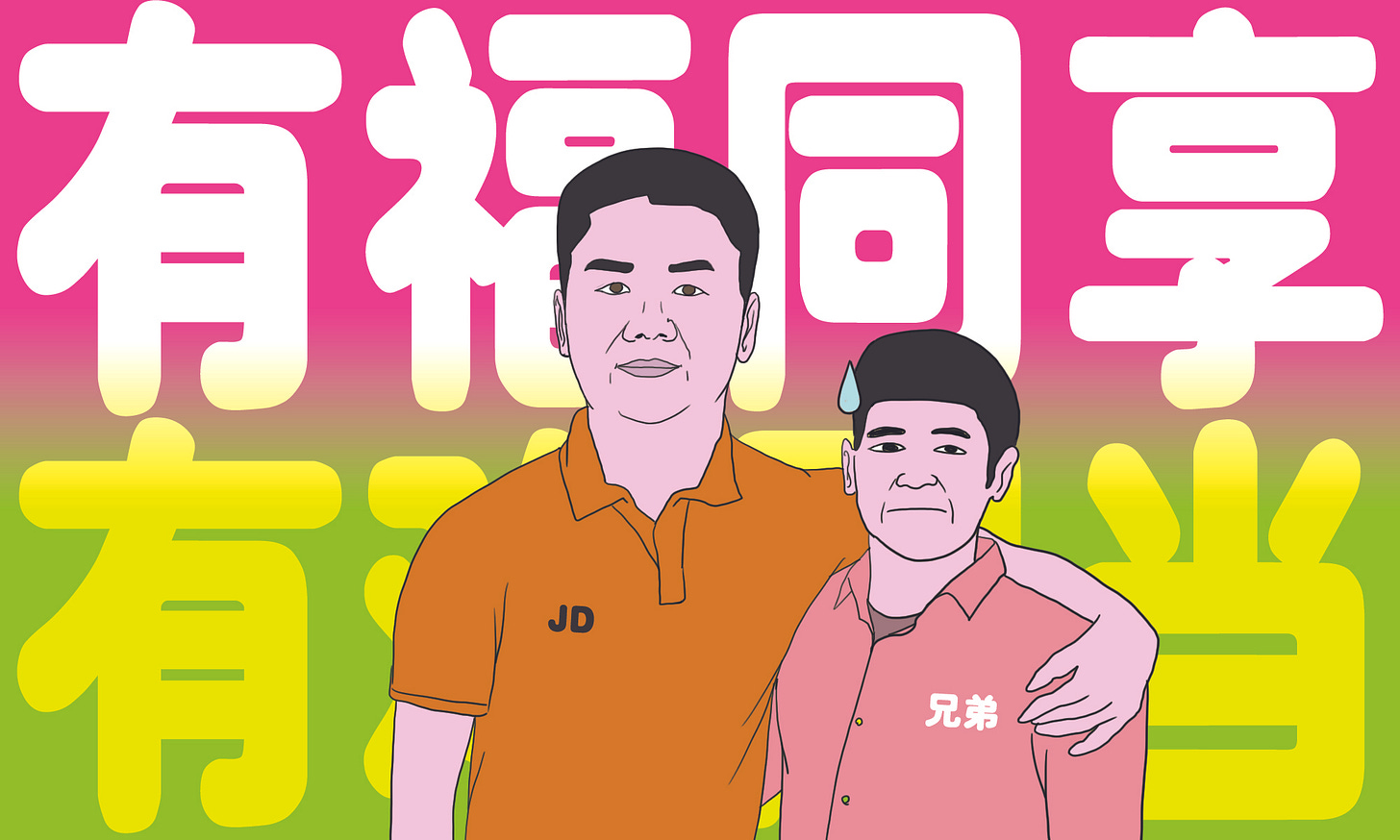Welcome to RealTime Mandarin—a multimedia resource to immerse you in the latest Chinese language trends, inspire you to practice and improve your Mandarin every week, and empower you to communicate with confidence.
Subscribe now to get the next issue straight to your inbox!
The founder of one of China’s biggest ecommerce businesses has been ridiculed online after a recording of one of his internal speeches was shared on social media.
Richard Liu (刘强东), the founder of JD.com, was delivering a speech to his management team during a virtual meeting on May 24. After it was leaked online, the speech became a top trending ”hot search” (热搜) term on social media.
In his speech, Liu announced changes to JD company policy.
First, he intends to reward high performing employees in sales:
“If your performance is excellent, you may never have to work overtime. The company will always appreciate you and offer you a very competitive package. If your performance is just average, as long as you work hard, the company will never fire you. ”
“如果你业绩好,你可以永远不需要去加班加点,公司永远是爱你,永远是给你非常好的收入待遇。如果你业绩假设没那么好,只达到了平均水平,你只要拼搏,公司永远不会辞退你。”
He also announced that from July onwards, employees in the procurement and sales department (采销), two functions which are integrated in JD, will get a 25% increase in their base salary with unlimited performance-based bonus. And the cash bonus for managers will increase by 30%.
Second, he will get rid of employees who are not performing or working hard enough.
“However, the company does not have a place for those who have poor performance and never work hard. These people will be removed from the company one by one. Anyone who has poor performance for a long time and never works hard is not my brother.”
“但是业绩不好,又从来不拼搏的人,这家公司永远不能容忍,一个不能容忍,都会逐步通过各种手段全部淘汰出局。凡是长期业绩不好,从来不拼搏的人,不是我的兄弟。”
It's the last sentence here, and particularly the phrase, “my brother”, which has triggered strong reactions.
Richard Liu, who also goes by the name “Brother Dong” (东哥), says “my brothers” a lot in internal speeches.
He first said it in 2018, when he described all the employees of the company as “his brothers”, in response to rumours that JD was preparing for mass layoffs, promising that:
JD will never sack any one of you, my brothers.
京东永远不会开除任何一个兄弟。
There are different ways to pronounce and say “brothers” (兄弟) depending on the context and meaning. Zoe explains more in the member podcast (including transcript)!
That put a stop to the rumours at the time, and it even became a popular meme. But in his comments this week, Richard Liu appears to have changed his definition of what “my brother” means, which is what has annoyed some people:
When business is good, no one cares who counts as his brother. Richard Liu once said that he is not talking about people who slack off at work. For him, only those who share in happiness and hardship are true brothers.
However, his definition was intentionally or unintentionally ignored. The outside world sees JD.com as a company where everyone is Liu’s brother. With Liu using this phrase again and again, perhaps some people really do believe that it is the case.
在生意好做的时候,没人去计较到底谁算是兄弟。刘强东曾解释过,他所说的不是那种在公司混日子的人,有福同享有难同当才是真正的兄弟。然而,他的解释被有意无意忽略了,外界把京东看成一家兄弟文化弥漫的公司,在东哥的一声声兄弟里,没准真有人犯了迷糊。
JD has struggled in recent years.
The company employs 550,000 staff in China, compared to only 20,000 employed by its competitor, PDD (拼多多), which generated over three times the profits of JD last year.
JD is facing trust issues within its workforce too.
It recently uncovered a “clocking-in” controversy (代打卡), where some employees asked colleagues to clock-in for them at their office workstation, while they stayed at home, sometimes for months on end.
According to some reports, over 10,000 JD employees are doing this every month.
But despite there being some sympathy for Richard Liu and JD, the majority of voices criticise him for going back on his word.
And for taking a step backwards towards a destructive and internally competitive working culture (known as “involuted” 内卷 in Chinese):
Richard Liu’s comments indicate he can’t come up with new ideas to deal with the zero-sum game. Instead, he has decided to step up on what he has been doing by exerting more pressure on the employees and intensifying the unproductive and unhealthy competition.
刘强东的这番表态,意味着他想不出什么新模式来应对这种此消彼长的竞争压力,转而想进行内部动员,驱使所有人强化内卷,将旧模式运用到极致。 [3]
20th century writer, Lao She 老舍, was quoted in media commentary too:
In The Rickshaw Boy, Lao She wrote: The Rickshaw boy believes that if he works hard enough, he would one day have a rickshaw of his own. Even on his deathbed, he still believes he hasn’t achieved his dream because he has not yet worked hard enough.
老舍在《骆驼祥子》中就写过:“祥子一直以为努力拉车,就会拥有一辆属于自己的黄包车,而祥子到死都认为他未能过上好日子,是因为拉车不够努力。” [3]
The Rickshaw Boy (骆驼祥子), the character in Lao She’s book of the same name, has become a metaphor in modern China for over-worked, underpaid employees of big tech firms, like JD.
You can read more about how a little knowledge of Lao She 老舍 and Lu Xun 鲁迅 can go a long way in this Deep Dive last year.
So, that’s what we’re learning about this week!
Favourite Five
1. 食言 shí yán
eat words; go back on one's word
你别管什么原因,刘强东这么修改兄弟的定义那就是食言 - No matter what the reason might be, Richard Liu broke his promise when he re-interpreted the term “brother”. [2]
2. 打补丁 dǎ bǔ ding
patch up, fix
刘强东打了补丁,把业绩好或者业绩不好但努力的人单独列了出来进行了区分 - Richard Liu further clarified that by “brothers” he was referring to those with good performance and those who work hard despite poor performance. [2]
3. 危机感 wēi jī gǎn
sense of crisis
京东危机感很浓厚,刘强东着急了,要击退竞争者 - There is a strong sense of crisis within JD: Richard Liu is anxious and wants to beat his competitors. [2]
4. 道德绑架 dào dé bǎng jià
moral hostage; guilt tripping
这就是道德绑架:你必须拼尽全力符合我的期待,才能得到我的认可 - This is guilt tripping: in order to be recognised, you have to give your all to meet my expectations. [3]
5. 有福同享,有难同当 yǒu fú tóng xiǎng, yǒu nàn tóng dāng
share in happiness and hardship
他所说的不是那种在公司混日子的人,有福同享有难同当才是真正的兄弟 - He’s not talking about those who slack off at work. He’s referring to those who share in happiness and hardship as being his true brothers. [1]
More: Read more about this phrase in the Sinica Phrase of the Week.
Consuming the Conversation
Useful words
6. 没准 méi zhǔn
maybe, perhaps
在东哥的一声声兄弟里,没准真有人犯了迷糊 - With Liu using this term “brothers” again and again, perhaps some people really do believe that anyone can be his brother. [1]
7. 猛批 měng pī
heavily criticise
这次刘强东猛批一些高管和员工懈怠 - This time Richard Liu heavily criticized some executives and employees for their laziness. [1]
8. 吸血 xī xiě
suck blood, exploit
业绩不好还不拼博每天睡觉的人,本质上是在吸公司其他员工的血 - Those that don’t work hard despite their poor performance are essentially living off their colleagues. [2]
Note: The colloquial pronunciation of blood here: xiě and not xuè.
9. 枷锁 jiā suǒ
shackles, chains
我们是时候摆脱这些思想的枷锁了 - It's time for us to break free from these mental shackles. [3]
Three-character phrases
10. 巨无霸 jù wú bà
huge, gigantic
如今出来了好多家平台一起分食蛋糕,还个个都已经长成了巨无霸 - Nowadays, the market (or the pie) is shared by several platforms, each of which has grown into a big corporation. [2]
11. 混日子 hùn rì zi
to muddle through, to drift along
在任何一个有业绩或盈利追求的组织,躺平或混日子都是难被接受的 - In any organization that sets KPI or pursues profit, being idle or slacking off is unacceptable. [1]
12. 解释权 jiě shì quán
the right to interpret, the authority to explain















